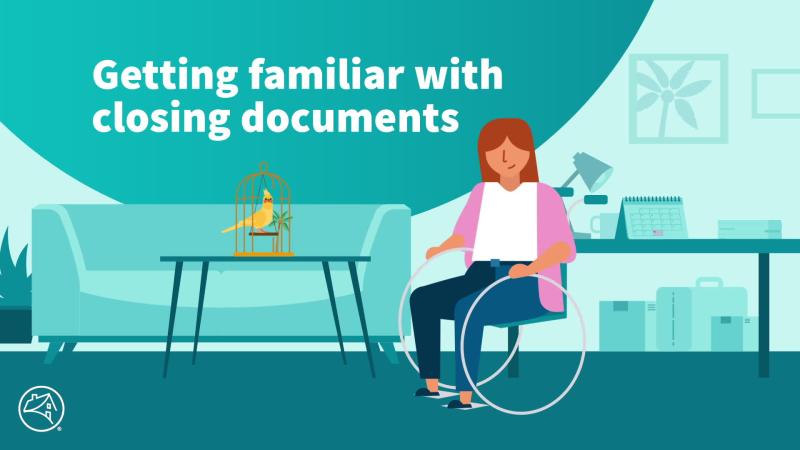What To Expect at Closing on a House
Buying a home is a huge accomplishment that deserves to be celebrated. By this time, you’ve completed purchase term negotiations, determined your loan, and potentially even planned for some home improvements. Before you say “cheers” to your new home, it’s important to understand the closing process — the last step to homeownership — that ensures the property is legally yours.
How do I close?
Schedule a closing date and location
Communicate regularly with your real estate professional and lender as you begin the closing process. It will be necessary to confirm your closing date and location with your lender, real estate professional, and closing agent.
Tips for a smooth close
Now is not the time to open new credit card accounts, make large purchases, or do anything that could negatively affect your credit score. The lender will verify all your outstanding debt at closing, and new debt can jeopardize your ability to close the loan.
You'll also want to avoid leaving or switching jobs as it’s important to have a history of steady and reliable employment while going through the loan-closing process.
Choose a title company
A few weeks before closing day, you’ll need to choose a title company so they can run a title search on the property to confirm legal ownership. A title company can also handle the distribution of money, so every party gets the proper amount of funds to complete the sale.
Prepare documents and funds
Depending on your location, your closing agent may be a title company, attorney, escrow company, or traditional lender. They ensure that your closing documents are ready, while your real estate professional will help resolve any remaining issues with the home itself.
At least three business days before closing, you will receive a closing disclosure that will detail how the funds will be disbursed at closing as well as the mortgage terms. Review this document carefully and don’t hesitate to ask your lender or real estate professional any questions. The funds required to close can typically be sent via wire transfer in advance or provided via a cashier’s check at closing.
Take your final walk-through
On or soon before your close date, it is very important to complete a final walk-through of the home. Your real estate professional should set up a time with the home seller for you to view the property, confirm that any negotiated repairs have been made, and ensure that the home didn’t take on additional damage since the first home inspection.
As you approach the closing process, obtaining homeowners insurance should be a priority. Most lenders require that you purchase a policy that covers the full or fair value of the property before they’ll actually lend you money. Policies can cover a number of unexpected things, like destruction or damage to the home’s interior and exterior in the case of a fire, hurricane, vandalism, or other disaster.
Keep in mind that most homeowners insurance policies do not usually cover the damage incurred from flooding or earthquakes; those events are usually covered under separate policies. It’s definitely wise to ask what is specifically covered and to shop around for rates and coverage from a few different insurers.
Getting through all the paperwork on closing day might take a few hours, but it will be worth your time.
You’ll likely attend the closing at the title company’s office with your own real estate professional, a closing agent, any co-borrower(s), and the seller’s real estate professional. Be sure to bring a state-issued photo ID and all the required documentation related to your purchase, including a copy of the purchase contract. Although it’s not needed at the closing table, you may want to consider lining up homeowners insurance prior to closing.
Review and sign your documents but only after you’ve carefully read them and are sure you understand the financial obligations described, along with your rights as a homeowner.
An important document you’ll review and may need to sign on closing day is the deed. The deed to your home is the physical, legal document that proves your property rights and ownership. The home seller must sign the deed at closing, and you may be required to as well.
Are you wondering how to get the deed? Your title company can help with that. They conduct a title search to make sure the person selling the home has the right to do so and then transfer ownership. Title companies also check properties against outstanding liens and claims.
You’ll need to check with the title company a few weeks after closing to make sure the county office officially recorded the deed.
Once you’ve signed all the required documents and provided your portion of the funds, you’ll receive the keys to your new home.
- Loan estimate and closing disclosure: You should receive a copy of a Loan Estimate just after you apply and a Closing Disclosure at least three business days before closing. The estimate and disclosure cover all the details of your loan.
- Loan application: The loan application contains key details about your finances and should be reviewed again for accuracy.
- Deed: A public document that shows the transfer of property ownership from the seller to you.
- Initial escrow disclosure: This document is required by federal law (if you are creating an escrow account) and accounts for financial obligations that extend beyond the loan itself (e.g., private mortgage insurance).
- Mortgage note (or promissory note): The note represents your commitment to pay the money back.
- Deed of trust/mortgage: The deed (or mortgage in some states) provides security for the loan. It uses the house you’re buying as collateral, which means if you default on mortgage payments, the lender may be able to foreclose on the house.
- Affidavits: These are legally binding documents that you sign to indicate that all the information you’re providing is accurate.
- Transfer tax declaration (if applicable): A form that applies to property transfer taxes that may be required in some cities, counties, and states.
- Certificate of occupancy (if newly constructed home): The certification indicates that the house is in compliance with building codes, and it is suitable for occupancy.









